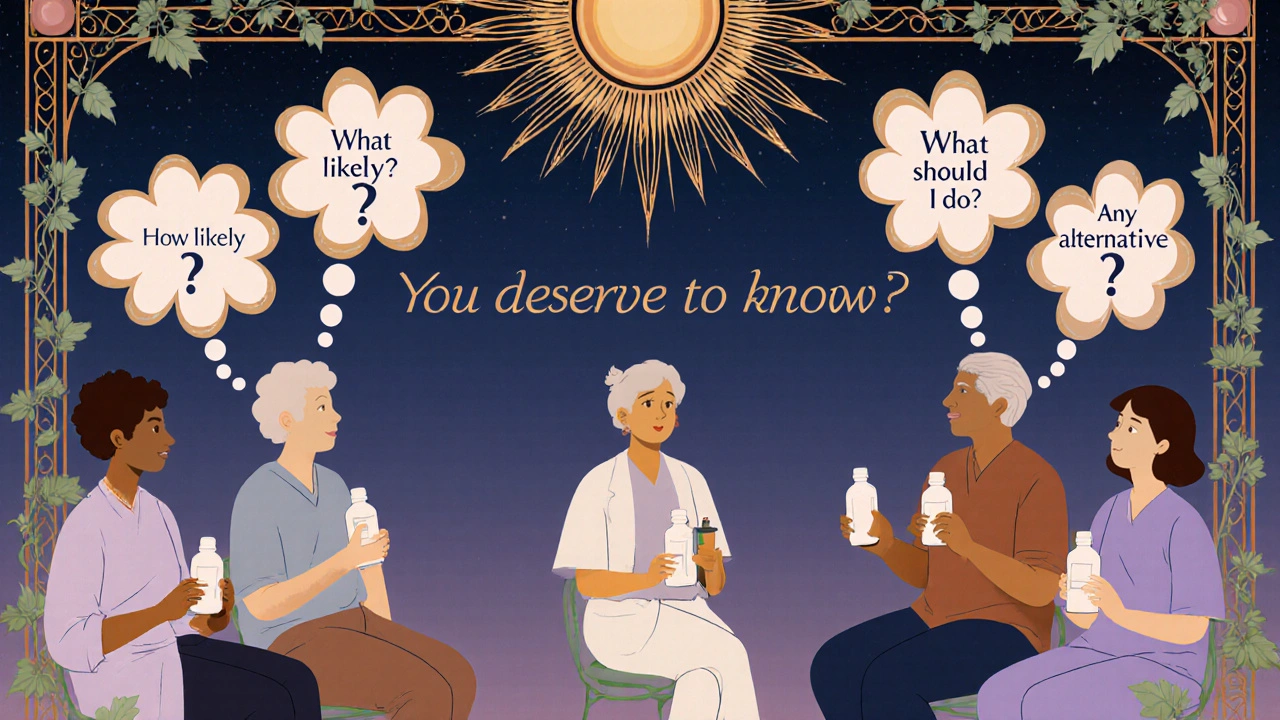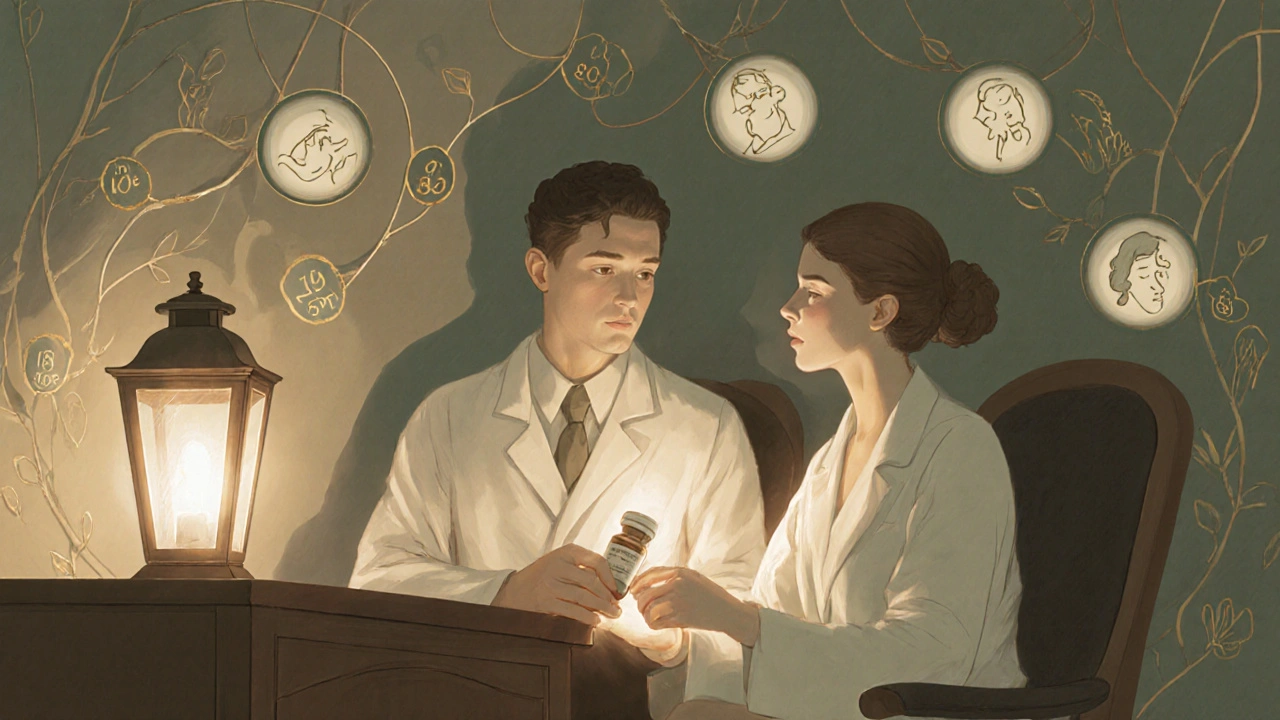Side Effect Probability Estimator
How Common Is This Side Effect?
This tool helps you understand the real probability of medication side effects based on FDA classifications from the article.
Most people don’t realize that the reason they stop taking their medication isn’t usually because it doesn’t work-it’s because they didn’t know what to expect. You’re prescribed a drug to help with high blood pressure, diabetes, or depression. You take it for a few days, and suddenly you’re dizzy, nauseous, or sleeping too much. You think, Is this normal? Did they forget to tell me? You stop taking it. And then you end up back in the doctor’s office, worse off than before.
This happens because side effect communication is broken. Doctors often say, "Common side effects include headache and dizziness," but never say how common. Is it 1 in 10 people? 1 in 100? You’re left guessing-and guessing wrong can cost you your health.
What You Really Need to Know About Side Effects
Not all side effects are created equal. The FDA and medical experts break them down by frequency and severity. This matters because your brain reacts differently to each.
- Common side effects happen in 1 out of 10 to 1 out of 3 people. Think: headache, dry mouth, mild nausea, fatigue. These are annoying but usually go away after a week or two.
- Uncommon side effects happen in 1 out of 100 to 1 out of 1,000. These might include dizziness when standing up or trouble sleeping.
- Serious side effects happen in less than 1 out of 1,000. These are rare but dangerous-like liver damage, severe allergic reactions, or heart rhythm changes. You need to know these, even if they’re unlikely.
Here’s the truth: most doctors only mention 3 to 4 side effects per medication, even though each drug can have 15 to 25. You’re getting a fraction of the picture. And that’s not because they’re hiding anything-it’s because they’re overwhelmed, too.
Why Doctors Don’t Tell You Everything
It’s not laziness. It’s science. A 2023 study found that listing every possible side effect increases anxiety by 34%. That’s not just discomfort-it can make you feel the side effects more. This is called the nocebo effect. If you’re told you might get a headache, your brain starts scanning for it. Suddenly, you’re noticing every little throb.
Doctors know this. So they try to protect you. But here’s the problem: protecting you from anxiety can backfire. If you’re not told about a side effect, and you get it anyway, you lose trust. A 2023 survey of over 12,000 patients showed that those who got clear side effect info rated their doctors 4.7 out of 5. Those who didn’t? 3.2 out of 5.
It’s not about giving you a 10-minute lecture on every possible reaction. It’s about giving you the right info-tailored to you.
How to Ask the Right Questions
You don’t have to wait for your doctor to bring it up. Take control. Here’s exactly what to say:
- "How likely is this side effect?" Don’t accept "common" or "rare." Ask: "Is this something 1 in 5 people get? 1 in 50?" This gives you real context.
- "What should I do if I experience this?" Don’t just hear about the problem-know the solution. "If I get nausea, should I take it with food? Should I call you?"
- "Is there a trade-off?" Ask: "Will this drug make me feel better, even if I get these side effects?" Some drugs cause fatigue but stop migraines. Others cause weight gain but fix depression. You need to weigh it.
- "What if I can’t handle this?" Say: "If the side effects are too much, what are my alternatives?" This opens the door to options without sounding like you’re giving up.
One patient in Bristol told me she asked her GP: "If you were me, would you take this?" He paused, then said, "I’d take it, but I’d start with half the dose and watch how I feel." That conversation saved her from quitting the drug entirely.

What to Do Before Your Appointment
Don’t wait until you’re in the exam room to think about this. Do a quick prep before your visit:
- Write down every medication you’re taking-including supplements.
- For each one, note: "What side effect scared me?" and "What did my doctor say?"
- Bring your own notes. Studies show patients who do this are 37% more likely to get clear answers.
Many clinics now use pre-visit questionnaires. If yours doesn’t, ask: "Can I fill out a quick form before I see the doctor about my meds?" It takes two minutes. It helps them help you.
What Happens After the Prescription
Getting the info is just step one. What you do next matters more.
Start with the lowest dose if possible. Many side effects fade as your body adjusts. Don’t quit after two days. Wait a week. Keep a simple log: "Day 3: mild headache after lunch. Took with food. Better." This helps your doctor spot patterns.
If something feels wrong-especially if it’s new, worsening, or scary-call your doctor. Don’t wait. You don’t need to be a crisis to deserve an answer. A 2023 AMA guideline says: "Thank you for letting us know you’re not taking your meds as prescribed. Can we talk through this?" That’s the tone you should expect.
Pharmacists are your secret weapon. In the UK, 51% of patients prefer getting side effect info from their pharmacist. They have more time. They see hundreds of people on the same meds. Ask: "What do most people say about this drug?" They’ll tell you.

The Bigger Picture: Why This Matters
Poor side effect communication isn’t just inconvenient. It’s expensive. In the US, it contributes to $100-$289 billion in wasted healthcare spending every year. In the UK, it’s harder to track-but the pattern is the same. People stop meds. They end up in A&E. They need hospital care. All because they didn’t understand what to expect.
And it’s getting worse. Adults over 65 take nearly five prescriptions on average. More drugs = more side effects = more confusion. If we don’t fix how we talk about them, more people will suffer needlessly.
But here’s the good news: when patients get clear, personalized side effect info, adherence jumps by 22%. That means more people stay on their meds. Fewer hospital visits. Better health. It’s not magic. It’s just good conversation.
Final Tip: You’re Not Being Difficult
Some people worry that asking too many questions makes them "hard to treat." It doesn’t. It makes you a better partner in your care. Doctors who handle these conversations well get higher ratings, fewer complaints, and less burnout. They want to hear from you.
Next time you’re handed a prescription, don’t just smile and say thanks. Say: "Can you tell me what to expect-and what to do if it happens?" That’s not being difficult. That’s being smart.
Side effects aren’t a secret. They’re part of the deal. And you deserve to know the full picture-before you take the first pill.







Vanessa Carpenter
November 26, 2025 AT 02:11Been there. Took my blood pressure med for three days, thought I was dying because my tongue felt like sandpaper. Turned out it was just dry mouth - common as dirt. I wish someone had told me that 1 in 5 people get it. Would’ve saved me a panic call at 2 a.m.
Bea Rose
November 26, 2025 AT 22:23Doctors omit side effects to avoid nocebo. That’s not protection. It’s negligence. If you don’t tell patients the truth, you’re not managing care - you’re managing fear.
Michael Collier
November 27, 2025 AT 04:43It is imperative to recognize that the dissemination of comprehensive side effect information constitutes a fundamental component of informed consent. The data presented in this article underscores a systemic gap in patient-provider communication, which, if unaddressed, may result in suboptimal therapeutic adherence and increased healthcare utilization. A structured, patient-centered approach to side effect disclosure is not merely beneficial - it is ethically obligatory.
Shannon Amos
November 28, 2025 AT 00:15So doctors are too overwhelmed to tell you all the side effects... but somehow have time to scribble a prescription and bounce out the door? 😏
stephen riyo
November 28, 2025 AT 17:34Wait... so you're saying I should ask how likely it is? Like, literally? Like, "Is this going to happen to me?" And then, like, follow up? And bring notes? And talk to the pharmacist? Like, I'm supposed to do all this? And then... wait... I'm supposed to log my headaches? Like, a journal? I don't even know how to spell journal right. I think it's journel? Or is it journaal? I'm confused now.
Wendy Edwards
November 29, 2025 AT 06:37Y’all don’t get it. This isn’t just about side effects - it’s about being heard. I took my antidepressant and felt like I was drowning in my own skin. I didn’t say anything because I thought I was being weak. Then I finally told my doc - she looked me in the eye and said, "That’s not normal, let’s adjust." I cried. Not because I was sad - because someone finally saw me. Don’t let fear silence you. You’re not crazy. You’re just human. And you deserve to feel better - not just survive.
Jaspreet Kaur
November 30, 2025 AT 05:20Medicine is a mirror of the soul. When we fear side effects we fear ourselves. The body speaks in whispers. We have forgotten how to listen. The doctor is not a priest with a clipboard. The pill is not a prayer. We must become the witnesses of our own healing. Not the victims of a system that reduces life to a chart of percentages. What is a 1 in 100 chance if not a soul trembling in silence?
Dan Rua
December 1, 2025 AT 23:57This is so well put. I always tell my mom to ask the pharmacist - they’re the real MVPs. I even printed out a little cheat sheet of questions and handed it to my doctor last visit. He smiled and said, "Finally, someone who’s prepared." 😊
Mqondisi Gumede
December 2, 2025 AT 07:51Western medicine is a scam. You think a pill fixes you? No. Your body is a temple. You think a doctor knows better than nature? They sell you poison and call it science. In Africa we use herbs. We don’t need your charts. Your percentages. Your fear. Your pills. You’re all just scared of the silence inside your own skin.
Cynthia Boen
December 3, 2025 AT 17:31Wow. Another article telling me I’m dumb for not asking enough questions. Thanks for the guilt trip. I didn’t know I needed a degree in pharmacology just to take a pill.
Amanda Meyer
December 3, 2025 AT 20:51While I appreciate the intent of this piece, I must question whether the proposed solutions are scalable. The burden of preparation falls disproportionately on patients, many of whom are elderly, undereducated, or economically strained. If systemic change is desired, then institutional reform - not patient empowerment - must be prioritized.
Jesús Vásquez pino
December 5, 2025 AT 06:44My dad died because he stopped his meds after getting dizzy. He didn’t know it was common. He thought he was dying. I wish someone had told him - or better yet, told him BEFORE he took it. This isn’t advice. It’s survival. Please share this. Someone’s life could depend on it.